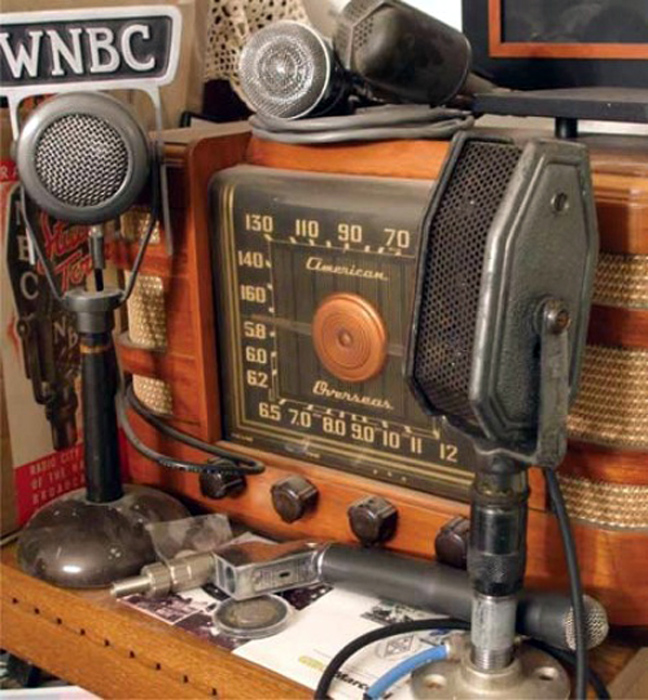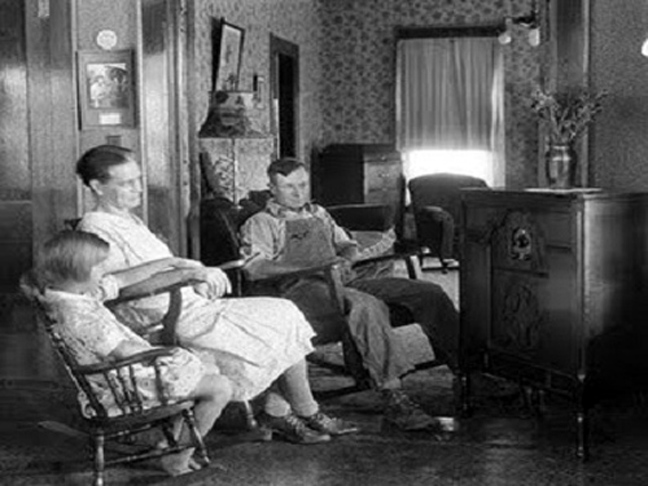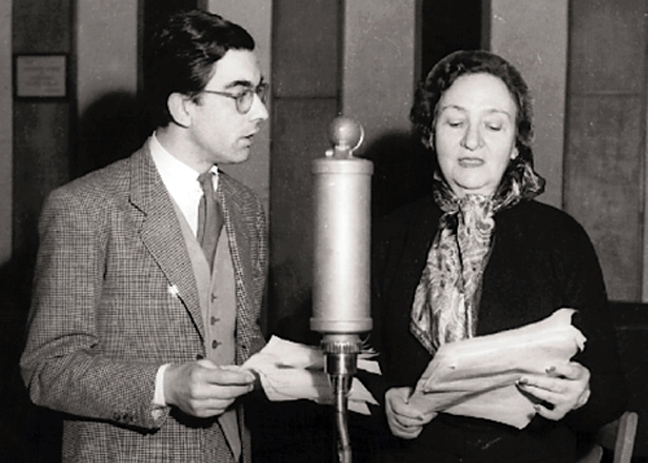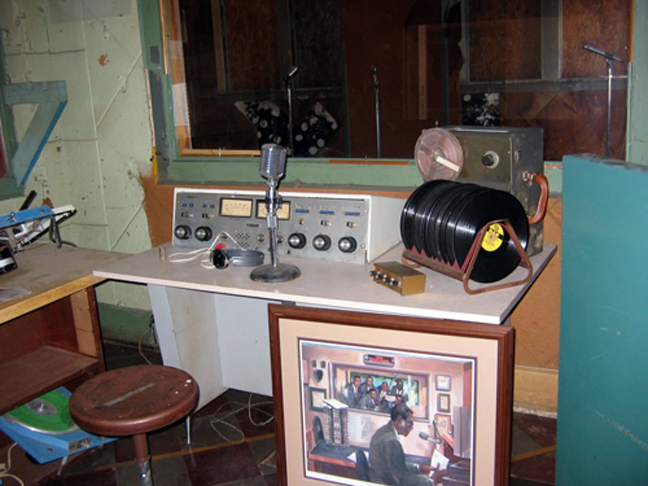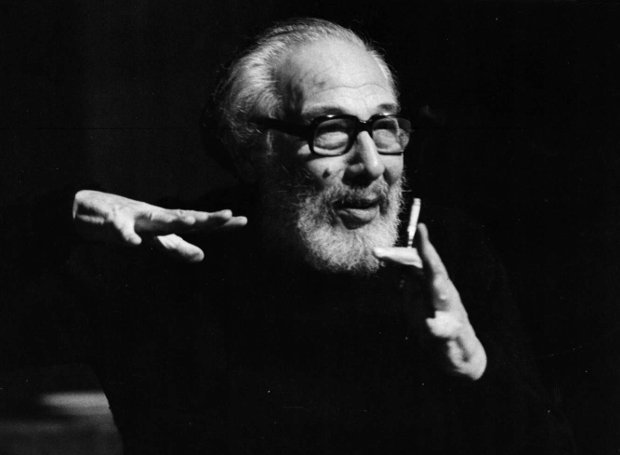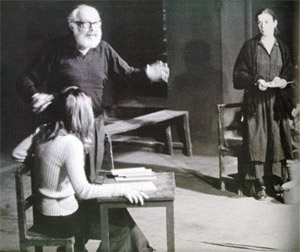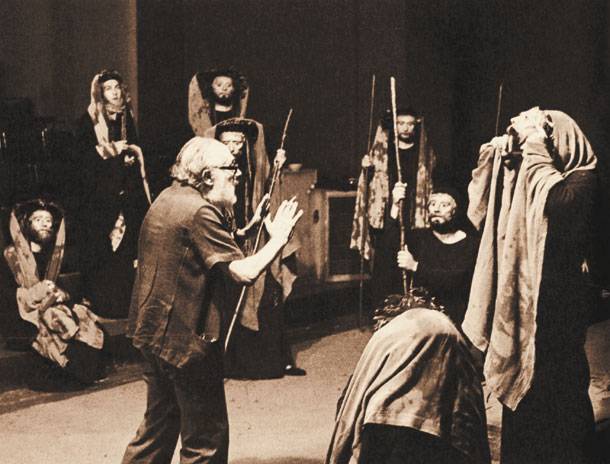«Είναι ένας εγγαστρίμυθος στο ραδιόφωνο. Μα πώς είναι δυνατόν να ξέρεις ότι δεν κουνάει τα χείλη του;» έλεγε ένας εκ των πρωταγωνιστών στην ταινία «Ημέρες Ραδιοφώνου» του πιστού στη νοσταλγία της παιδικής αφήγηση, Γούντι Άλεν. Αυτή η περίφημη ατάκα του έργου είναι μια από όλες που χρησιμοποίησε ο σκηνοθέτης με τα γνωστά αυτοαναφορικά flashback, στην προσπάθειά του να σκιαγραφήσει τις ημέρες της χρυσής εποχής του ραδιοφώνου στην Αμερική των 40’s, προτού η εικόνα αλλοιώσει ανεπανόρθωτα την φαντασία και ίσως και τα ιδανικά ενός ολόκληρου κόσμου...
Ανάλογη χρυσή ραδιοφωνική εποχή έζησε και η Ελλάδα, μεταχρονολογημένα βέβαια, ως είθισται, η οποία διήρκεσε μέχρι και την δεκαετία που η μικρή οθόνη ιδιωτικοποιήθηκε και οι περισσότεροι υποκλίθηκαν στην έγχρωμη ποικιλία θεαμάτων και στην εύπεπτη παρουσίαση τους. Σε εκείνη τη χρυσή εποχή, αγαπημένη ραδιοφωνική εκπομπή, σήμαινε παραμονή στο σπίτι, συντονισμό την κατάλληλη ώρα, ηχογράφηση για μελλοντικές ακροάσεις, και καθήλωση με απόλυτη ησυχία για μια καθώς πρέπει, ευλαβική ακρόαση του αγαπημένου και συνάμα μελωδικού εκφωνητή. Και όλα αυτά μέσα από μικρά τρανζιστοράκια ή μετέπειτα ραδιοκασετόφωνα, με έναν ήχο γεμάτο θόρυβο και παράσιτα που εξαφανίζονταν με ένα κούνημα της κεραίας...
Η ιστορία των ερτζιανών
Όταν το 1895, ο Γουλιέλμο Μαρκόνι, είχε κατορθώσει να μεταδώσει τα ηχητικά σήματα Μορς, διαμέσου των ερτζιανών κυμάτων, ίσως δεν γνώριζε πως εκατό και πλέον χρόνια μετά, θα θεωρείτο ο πατέρας του ραδιοφώνου. Κι όμως, αυτό ακριβώς αποτέλεσε την απαρχή του εν λόγω μέσου επικοινωνίας. Λίγο αργότερα, η επιστημονική έρευνα στραμμένη στην εκμετάλλευση των ραδιο - ηλεκτρομανγητικών κυμάτων και την τελειοποίηση των ηλεκτρονίων, οδήγησε στην ανάπτυξη της ραδιοφωνικής λυχνίας. Αυτό ακριβώς θα ονομαζόταν στη διάρκεια του 19ου αιώνα ραδιόφωνο. Βέβαια, παρόλο που η πρώιμη έρευνα που μετεξέλιξε την ανακάλυψη του Μαρκόνι στο προσφιλές μας ραδιόφωνο, πραγματοποιήθηκε κυρίως από Βρετανούς και Γερμανούς, εκείνοι που μαγεύτηκαν από το ξεχωριστό μέσο ήταν οι Αμερικάνοι, δημιουργώντας μάλιστα μια ολόκληρη βιομηχανία που του χάρισε την εμπορική του διάσταση.
![]()
Η πρώτη αναμετάδοση πραγματοποιήθηκε από τον πρωτοπόρο της αμερικανικής ραδιοφωνίας τον Reginard Fessenden, την παραμονή των Χριστουγέννων του 1906. Ένα χρόνο αργότερα, το 1907, ένας ακόμη αμερικανός ερευνητής, ο Lee de Forest, βοήθησε σημαντικά στην ανάπτυξη της σύγχρονης μορφής του ραδιοφώνου, θέτοντας σε εφαρμογή τη ραδιοφωνική λυχνία που αργότερα αντικαταστάθηκε από το τρανζίστορ. Κάπως έτσι το 1910 ο Forest γίνεται ο πατέρας της σύγχρονης ραδιοφωνίας μεταδίδοντας μέσω ραδιοφώνου, μια ολόκληρη οπερέτα από τη Μητροπολιτική όπερα της Νέας Υόρκης, στην οποία πρωτοακούστηκε και ο διάσημος τότε Ενρίκο Καρούζο.
![]()
Την ίδια χρονιά κι αφού έχει ψηφιστεί σχετικός νόμος για την χρήση ραδιοκυμάτων «Ασύρματη Επικοινωνία των Πλοίων» οι νύχτες των ΗΠΑ αρχίζουν να γεμίζουν με ένα νέο θόρυβο. Στην μακρινή ήπειρο έχουμε ήδη περάσει στην εποχή της ραδιοφωνίας των γειτόνων, αφού σε κάθε γειτονιά ραδιοερασιτέχνες συναρμολογούν πομπούς και δέκτες και επικοινωνούν μεταξύ τους. Ακολουθεί η ψήφιση του «Ραδιοφωνικού κανονισμού» που αξιώνει όλους τους ραδιοφωνικούς σταθμούς να πάρουν άδεια από το υπουργείο, και με αυτό τον τρόπο χαιρετίζει την πρώτη ολοκληρωμένη προσπάθεια ρύθμισης όλων των τομέων της ραδιοφωνικής αναμετάδοσης. Η παρόμοια πορεία που ακολουθεί και η Ευρώπη έχει ως αποτέλεσμα να αρχίσουν να αναμεταδίδονται οι πρώτες ραδιοφωνικές εκπομπές γύρω στο 1919.
![]()
Περίοδος σταθμός στην ευρωπαϊκή ιστορία του αγαπημένου μέσου, θεωρείται η μετατροπή της British Broadcasting Company σε κρατική υπηρεσία με την επωνυμία British Broadcasting Corporation. Με τον τρόπο αυτό, σταθεροποιούνται όλα τα θεμελιώδη χαρακτηριστικά ενός συστήματος που θα μιμηθούν αργότερα όλες οι άλλες ευρωπαϊκές χώρες, κατά την διάρθρωση των δικών τους ραδιοφωνικών σταθμών. Έκτοτε το BBC θα διατηρήσει έναν μονοπωλιακό χαρακτήρα στις αναμεταδόσεις, με τις λειτουργίες να διέπονται πλέον από τον Βασιλικό Νόμο, έως και την είσοδο και τη νομιμοποίηση της τοπικής ιδιωτικής ραδιοφωνίας που έγινε στην Αγγλία το 1972.
Τα ελληνικά ραδιοκύματα
Επί ελληνικού εδάφους, την πρώτη απόπειρα ραδιοφωνικής εκπομπής πραγματοποιεί η Διοίκηση Ραδιοφωνίας του υπουργείου Ναυτικών (ΔΡΥΝ) στις εγκαταστάσεις του στο Βοτανικό, το 1923, ενώ δύο χρόνια αργότερα, το 1925, η σχολή Μεγαρέως επιχειρεί δυο πειραματικές ραδιοφωνικές εκπομπές, μια εκ των οποίων περιλάμβανε μετάδοση μιας μικρής σχολικής γιορτής. Η εκπομπή προαναγγέλλεται στον τύπο της εποχής κι έτσι μπορούν και την παρακολουθούν οι λίγοι, περίπου 200 άτομα σύμφωνα με έρευνα της εποχής, που στο σαλόνι τους στέκει σε περίοπτη θέση το ραδιόφωνο. Οι τότε έλληνες κάτοχοι της πολυτέλειας που έφερε το όνομα ραδιόφωνο, είναι υποχρεωμένοι να καταβάλουν ως συνδρομή το σημαντικό ποσό των 500 δραχμών στη διεύθυνση Λαχείων του Στόλου που υπαγόταν στο υπουργείο Ναυτικών.
![]()
Ακολουθούν τρία χρόνια από εκείνη την πρώτη μετάδοση, ώσπου ο Χρήστος Τσιγγιρίδης να ιδρύσει τον πρώτο ραδιοφωνικό σταθμό στην Ελλάδα και στα Βαλκάνια, με έδρα την συμπρωτεύουσα. Ο σταθμός θα κυριαρχήσει στη ζωή της Βόρειας Ελλάδας για περισσότερο από 20 χρόνια.
Την ίδρυση του σταθμού του Τσιγγιρίδη ακολουθεί ο διαγωνισμός για την εγκατάσταση εθνικού ραδιοφωνικού σταθμού. Οι πρώτοι που αναλαμβάνουν το έργο, αδυνατούν να το πραγματοποιήσουν και κηρύσσονται έκπτωτοι. Μέχρι που την εγκατάσταση και την εκμετάλλευση των πρώτων χρόνων αναλαμβάνει η εταιρεία Τελεφούνγκεν, επί κυβερνήσεως Ελευθερίου Βενιζέλου, με την επίσημη κατοχύρωση να γίνεται εν έτει 1936, μετά από διαγωνισμό που πραγματοποιεί ο Ιωάννης Μεταξάς. Τότε κατασκευάζονται κτίρια στα Νέα Λιόσια για να τοποθετηθεί εκεί ο ραδιοφωνικός πομπός μεσαίων κυμάτων 15KW, ενώ στο Ζάππειο Μέγαρο γίνεται η διαρρύθμιση των τριών στούντιο του σταθμού.
![]()
Την ίδια χρονιά ιδρύεται και η Υπηρεσία Ραδιοφωνικών, ΥΕΡ, με γραφεία στην οδό Βουλής. Με την πάροδο του χρόνου οι ανάγκες για έμψυχο υλικό αυξάνονται και με την κήρυξη του πολέμου το ραδιόφωνο εμψυχώνει και ενημερώνει του Έλληνες. Όταν τα γερμανικά στρατεύματα εισέρχονται στην Αθήνα σπεύδουν να καταλάβουν τους ραδιοθαλάμους του Ζαππείου και τις εγκαταστάσεις του πομπού στα νέα Λιόσια. Όταν όμως τα στρατεύματα αποχωρούν από την Αθήνα, ανατινάσσουν τον ένα από τους δύο πομπούς που υπάρχουν πλέον στα Λιόσια. Αποτέλεσμα ο ραδιοφωνικός σταθμός την ημέρα απελευθέρωσης της πόλης δεν λειτουργεί. Ο σταθμός εκπέμπει και πάλι, στις 20 Οκτωβρίου 1944 και ώρα 1:25 μ.μ., με την βοήθεια ενός μικρού πομπού που διέθετε το Πανεπιστήμιο Αθηνών.
Σχεδόν ένα χρόνο αργότερα οι εγκαταστάσεις της ΑΕΡΕ περιέρχονται στο νεοϊδρυόμενο Εθνικό Ίδρυμα Ραδιοφωνίας (ΕΙΡ). ΤΑ χρόνια που ακολουθούν δημιουργούνται ο ραδιοφωνικός σταθμός Βόλου, Λάρισας, Ιωαννίνων, το «Μπουρίνι», ο ερασιτεχνικός σταθμός της Μυτιλήνης, ο σταθμός της Καβάλας, της Τρίπολης. Τότε δρομολογείται και πραγματώνεται και η δημιουργία του Δεύτερου και του Τρίτου προγράμματος. Το 1975 η ΕΙΡ μετατρέπεται σε Ελληνική Ραδιοφωνία Τηλεόραση Α.Ε. ενώ το 1987 δημιουργείται ενιαίος φορέας ο οποίος περιλαμβάνει την ΕΡΤ και την ΕΡΑ (Ελληνική Ραδιοφωνία) με το Πρώτο, Δεύτερο, Τρίτο, Τέταρτο και Πέμπτο πρόγραμμα. Εκείνη την ίδια χρονιά βέβαια ξεκινά και η έκρηξη της ελεύθερης ελληνικής ραδιοφωνίας με πρώτο σταθμό τον 984 του Δήμου Αθηναίων.
Οι πρώτοι πρωταγωνιστές του μικροφώνου
![]()
Οι πρώτοι που εμπλούτισαν τις αναμνήσεις των Ελλήνων με την φωνή τους ήταν η αλησμόνητη Αφροδίτη Λαουτάρη, η Αγγελική Κότσαλη και η Κονταράτου. Ακολούθησαν ο Μιχάλης Κοφινιώτης, λαμπρό αστέρι της οπερέτας, η Νιόβη Πηνιατόγλου, ο Κώστας Σταυρόπουλος, ο ιστορικός εκφωνητής Τζων Βεϊνόγλου, ο Μιχάλης Γιαννακόπουλος, που με τις αθλητικές εκπομπές του κατέκτησε το πανελλήνιο, ο Νίκος Χάκκας, η Καίτη Ασπρέα, ο Γ. Κάρτερ, η Αντιγόνη Τριφύλλη, η Καίτη Λιδωρίκη, η Ντόρα Βολανάκη, ο Γιάννης Μιχαλόπουλος, η Ιωάννα Ρουμάνη, ο Ι. Βροντάκης, η Ελπίς Κουκάκη, η Διδώ Πετροπούλου, η Μαίρη Ιγγλέση, ο Λουκιανός Ροζάν και ακολούθησαν αμέτρητοι ακόμα...
![]()
Στις αρχικές εποχές, το ραδιόφωνο εκτός από τις εκπομπές, καταγράφει και μια κοινή πορεία με το θέατρο. Πολλές από τις σημαντικές παραστάσεις της θεατρικής μας ιστορίας παραμένουν στην «σκιά», αφού εκτελούνται στο ραδιόφωνο. Το θέατρο του ραδιοφώνου, συγκεντρώνει αριθμητικά πολύ περισσότερο κοινό, αφού μπορεί και φτάνει στις πιο απομακρυσμένες περιοχές. Από τους θεατρικούς ραδιοφωνικούς ρόλους περνούν και οι μεγαλύτεροι των ηθοποιών, πρωταγωνιστές του Εθνικού Θεάτρου, με σκηνοθέτες τους κορυφαίους του είδους. Η Μαρίκα Κοτοπούλη, ο Αχιλλέας Μαμάκης, ο Δημήτρης Μυράτ, ο Δημητρης Χορν, η Κυβέλη, η Δέσπω Διαμαντίδου, ο Δημητρης Παπαμιχαήλ, η Μελίνα Μερκούρη, η Κατίνα Παξινού, η Κάκια Παναγιώτου, είναι μόνο μερικοί από τους ηθοποιούς που χαρίζουν την φωνή τους αναμεταδίδοντας μαγικές σκηνές για τους ακροατές.
![]()
Η συναρπαστική, καινούργια εμπειρία του πρώτου μέσου, που εκμηδένισε τις αποστάσεις, χαράσσει από τα πρώτα της βήματα ανεξίτηλα τα σημάδια της στην ιστορία, προσφέροντας ταυτόχρονα τεράστιες δυνατότητες στην πολιτιστική ανάπτυξη, στην ενημέρωση και στην ψυχαγωγία ενός λαού. Οι απαρχές του μέσου στην Ελλάδα, οι κορυφαίες στιγμές της κοινωνικής παρουσίας του, ο καθοριστικός ρόλος του στην κατοχή και την Αντίσταση, η συμβολή του στον πολιτισμό και η απελευθέρωσή του, το μετατρέπει σε απαραίτητο «συστατικό» ενός σπιτιού ή ενός απογεύματος.
Η Θεία Λένα
Στα δύσκολα χρόνια της Γερμανικής Κατοχής, η Αντιγόνη Μεταξά - συγγραφέας παιδικής λογοτεχνίας και δημιουργός του πρώτου παιδικού θεάτρου στην Ελλάδα – ως συνεργάτρια του Ραδιοφωνικού Σταθμού Αθηνών από το 1938, αναλαμβάνει να διευθύνει την καθημερινή «Ώρα του Παιδιού».
![]()
Χρησιμοποιώντας το ψευδώνυμο «Θεία Λένα» συντρόφευε καθημερινά εκατοντάδες χιλιάδες παιδικές ψυχές. Η χαρακτηριστική μουσική της εκπομπής της υπήρξε το δημοφιλέστερο παιδικό άκουσμα περίπου για μία τριακονταετία και οι υπηρεσίες υπήρξαν ανεκτίμητες για την εποχή.
«Καλημέρα παιδιά. Πέστε και σεις Καλημέρα», έλεγε για το καλωσόρισμα και ακολουθούσε η διασκέδαση που συνοδευόταν από τη διδαχή και την καθοδήγηση, με την Θεία Λένα να συνθέτει και να εκτελεί καθημερινά την παρουσία με διαφορετικούς τρόπους. Ένας εξ'αυτών η «Ελενίτσα», την οποία ενσάρκωνε η ενήλικη Ρηνούλα Μενάνδρου, που απαντούσε στις περισσότερες ερωτήσεις και λάνσαρε τα τραγούδια της.
Η κυριαρχία των πειρατών
«Τον πειρατή! Τον πειρατή! Ψίθυροι και παράσιτα, φωτιές από μιαν άλλη γη, κύματα γέλιου που ξεσπά, αφιερωμένο εξαιρετικά» τραγουδούσε ο Διονύσης Σαββόπουλος το 1979, χρονιά που κυκλοφόρησε τη «Ρεζέρβα» που περιλάμβανε το ομώνυμο τραγούδι. Ο «Πειρατής» που περιέγραφε στους στίχους του ο Σαββόπουλος, ήταν εμπνευσμένος από τον μαγικό κόσμο των ερασιτεχνών της επικοινωνίας, που προσέφεραν την εναλλακτική λύση για μια διαφορετική ακρόαση.
Στη δεκαετία του ’60, εκτός από τις λιγοστές εκπομπές του κρατικού ραδιοφώνου υπήρχε και ο αμερικανικός σταθμός, της βάσης της Νέας Μάρκης. Από εκεί τρεις φορές την εβδομάδα εκπέμπονταν ηχογραφημένα προγράμματα με Αμερικανούς dj’s οι οποίοι δημιουργούσαν το δικό τους top10 από ξένα τραγούδια εμπλουτίζοντάς το πάντα με μουσικές πληροφορίες, ώστε να εκπαιδεύουν σε προχωρημένες, για τα ελληνικά δεδομένα της εποχής, μουσικές και γλώσσες.
![]()
Αυτό όμως δεν ήταν αρκετό για να ικανοποιήσει την ακόρεστη δίψα των τότε ακροατών με αποτέλεσμα στην ραδιοφωνική σκηνή να αρχίσουν να εμφανίζονται διάφοροι ερασιτέχνες, έφηβοι και νέοι οι οποίοι φοιτώντας σε σχολές ηλεκτρονικών, πειραματίζονταν θέλοντας να εφαρμόσουν την θεωρία στην πράξη.
Πομποί, δέκτες, λυχνίες, watt και κεραίες αντικαθιστούσαν το σχοινί της μπουγάδας. Πατέντες, ιδιοκατασκευές, και μεταχειρισμένα ανταλλακτικά από το Μοναστηράκι, εξέπεμπαν μελωδίες μετά το μανιώδες ξεφύλλισμα της «Τεχνικής Εκλογής», δημιουργώντας σταθμούς βραχύβιους, γειτονικής εμβέλειας, με στούντιο τα διάφορα πλυσταριά και κωδικά πάντα ονόματα. Όταν τα ραδιογωνιόμετρα άρχισαν να βγαίνουν στο κυνήγι για να συλλάβουν τους παραβάτες, οι πειρατές μετέτρεπαν του σταθμούς σε κινητούς μεταφέροντας του από πλυσταριό σε πλυσταριό...
Σ’ αυτή την γοητευτική παρανομία, μουσικές, λόγος διαφορετικός από τον άκαμπτο του κρατικού ραδιοφώνου, και αφιερώσεις γίνονταν το διαβατήριο για την ανάπτυξη των σχέσεων της νέας κυρίως γενιάς. Η ήρεμη επανάσταση των πειρατών του ραδιοφώνου άνοιξε την πόρτα σε ξένες μουσικές, και σε νέα δεδομένα γεννώντας την επιθυμία μιας «ελεύθερης ραδιοφωνίας», που ξεκίνησε από το τρίτο πρόγραμμα του Μάνου Χατζηδάκη και ολοκληρώθηκε μόλις το 1987, χρονιά αλλαγής πορείας για το ραδιόφωνο.
![]()
Στις 31 Μαΐου, άνοιξε επίσημα ο πρώτος μη κρατικός ραδιοφωνικός σταθμός, ο «Αθήνα 984», με διευθυτή τον Γ. Τζανετάκο. Στον σταθμό μετακόμισαν και ξεκίνησαν εκπομπές πολλά γνωστά ονόματα δημοσιογράφων και παραγωγών της εποχής. Τσαουσόπουλος, Έβενης, Αβραάμογλου, Σαραντής, Πολυχρονίου, Ραράκος, αλλά και Ψαριανός, Λάλας, Ταγματαρχης, Παναγιωτόπουλος, Μητσικώστας και πολλοί άλλοι. Ακολούθησαν και άλλοι δημοτικοί ραδιοφωνικοί σταθμοί όπως το ΚΑΝΑΛΙ 1 του Πειραιά, ο Δίαυλος 10, και το Μάιο του 1988 οι δύο πρώτοι ιδιωτικοί ραδιοσταθμοί ΑΝΤΕΝΝΑ, ιδιοκτησίας Μίνου Κυριακού, και φυσικά ο TOP FM, ιδιοκτησίας Λαμπράκη. Από τότε το μποτιλιάρισμα στα ερτζιανά αρχίζει να γίνεται ασφυκτικό.
Τα αστέρια της Ελεύθερης Ραδιοφωνίας
Αν τις παλαιότερες δεκαετίες τα πρωινά φιλοξενούσαν ραδιοφωνικά σήριαλ, με πολύ καλούς ηθοποιούς στην ΕΙΡ, όπως η «Λάουρα» με τη Βέρα Ζαβιτσιάνου, τα βράδια «Τα Χρονικά της ημέρας» και τα Σαββατοκύριακα τα «Νέα Ταλέντα» του Οικονομίδη την δεκαετία του μποτιλιαρίσματος οι εκπομπές υπήρξαν πιο εναλλακτικές.
Από τις ρετρό ζώνες των αναζητήσεων του Ερυθρού Σταυρού, του Δελτίου της Υδρογραφικής, του Δελτίου Τιμών του Χρηματιστηρίου Αθηνών και των Τιμών Πώλησης διαφόρων οπωρολαχανικών καθώς και τα αποτελέσματα των εισαγωγικών εξετάσεων, περάσαμε στα διαφημιστικές εκπομπές των μεγάλων δισκογραφικών εταιρειών, που μας σύστηναν τα νέα αστέρια του λαϊκού πενταγράμμου. «H Polygram παρουσιάζει» ήταν ο τίτλος και οι καλλιτέχνες του σήμερα ήταν οι πρωτοεμφανιζόμενοι του χθες.
Σε εκείνες τις ρετρό πρώτες εποχές πριν περάσουμε στο σύγχρονο χθες ώρες χαλάρωσης προσέφερε και το πρόγραμμα της EPA 5, η λεγόμενη «Φωνή της Ελλάδας» που ξετρύπωνε σε κάθε μεριά του πλανήτη πατριώτες. Χαρακτηριστικοί διάλογοι:
«-Ο Γιάννης από Τασμανία αφιερώνει στον ξάδερφό του, Βαγγέλη που ταξιδεύει με ένα τάνκερ στην Βενεζουέλα, κάτι από Καζαντζίδη και στέλνει την αγάπη του και στους συγγενείς τους στο Αγρίνιο.
-Ευχαριστούμε Γιάννη. Καλά ταξίδια Βαγγέλη. Χαιρετισμούς στο όμορφο Αγρίνιο».
![]()
Γλυκιές αναμνήσεις και κερδισμένες εντυπώσεις την εποχή εκείνη προσέφερε και η εκπομπή «Πες μας Σωκράτη» με τον αξέχαστο Μίμη Φωτόπουλο και την κλασσική ατάκα της εκπομπής «τι να σας πω βρε παιδιά... ένα ξέρω, ότι τίποτα δεν ξέρω».
Τις χρυσές εποχές που ακολούθησαν εκτός από το ευφάνταστο περιεχόμενο υπήρχαν και ευφάνταστοι τίτλοι με αποκορύφωμα την εποχή της ελεύθερης ραδιοφωνίας και της άνθισης των ιδιωτικών σταθμών.
Αλησμόνητες για πολλούς στιγμές προσέφερε και το «Καλησπέρα σας, κύριε Έντισον» με τον Γιώργο Παπαστεφάνου, αλλά και οι «Λαϊκοί Βάρδοι» του Πάνου Γεραμάνη, καθημερινή εκπομπή αφιερωμένη στο ρεμπέτικο τραγούδι, χαρακτηριζόμενη από πολλούς ως κιβωτός γνώσης και αγάπης που αναζωογόνησε τη συλλογική μας μνήμη. Το «Σκάλα για τ’ αστέρια», στο Δεύτερο πρόγραμμα με την Μαριτίνα Πάσαρη, η Ρηνιώ Παπανικόλα, ο Αργύρης Ζήλος και ο Άκης Δασκαλόπουλος, το «Όλα τα πρωινά του Κόσμου» του Κώστα Γιαννόπουλου, το «Καθημερινό Καλειδοσκόπιο», ένα μαγκαζίνο με ζευγάρι εκφωνητών που άλλαζε σχεδόν κάθε σεζόν( αλησμόνητο ζεύγος ο Δάνης Κατρανίδης και η Γωγώ Ατζολετάκη) ήταν μερικές ακόμα της λίστας των αξέχαστων στιγμών.
Πολλών αγαπημένη ήταν και η μεταμεσονύχτια ζώνη, με διάφορες εκπομπές, όπως το «Αεροστούντιο Μπολερό», στις αρχές της δεκαετίας του '80, μετά τις αναζητήσεις του Ερυθρού Σταυρού με jingle της Λένας Πλάτωνος όπου συμμετείχαν η Άννα Παναγιωτοπούλου και ο Στάθης Ψάλτης.
![]()
Μέσα στην δεκαετία του '80, στην κρατική ραδιοφωνία άλλη μια εκπομπή με τον ευφάνταστο τίτλο «Τρεις στην μπανιέρα και ένας απ'έξω» με τους Λάκη Λαζόπουλο, Δημήτρη Πιάτα και Μίνα Αδαμάκη κατέκτησε κοινό και εντυπώσεις. Αλλά και ο Κώστας Μυλωνάς με την μεταμεσονύχτια εκπομπή «Ελεύθερα τη γνώμη σου» που κρατούσε με κουβεντούλα παρέα στους ακροατές μέχρι να κλείσουν τα μάτια. Ο ίδιος παραγωγός διατηρούσε μια ακόμη εκπομπή πιο χαλαρή, που έμεινε στην ιστορία για τα περίφημα σπασίματά της:
«Σπάστε μου κάτι ρε παιδιά, το έχω ανάγκη». Οι ακροατές καλούσαν κι έσπαγαν ότι έβρισκε ο καθένας, ένα πιάτο, ένα ποτήρι, ένα τασάκι μέχρι που μια μέρα κάποιος κάλεσε λέγοντας «Έλα, βάζω μπροστά τη μπουλντόζα να γκρεμίσω το μαγαζί μου»!
Αδύνατον να απουσιάσουν από την λίστα και τα αείμνηστα τηλεφωνικά ραντεβού, πολύ πριν τα τηλεοπτικά της Βάσιας Τριφύλλη, με τον Άκη Διαλυνό. «...Είμαι 1.80, μελαχρινός με πράσινα μάτια. Εγώ 1.70, ξανθιά, με τέλειες αναλογίες... Τι μουσική ακούς; Πού βγαίνεις τα βράδια; ...και ούτω καθεξής. Το χιούμορ και οι ατάκες χαρακτηρίζονταν εξαιρετικές με αθώα και ανέμελη διάθεση και τα ραντεβού κλείνονταν με ανταλλαγή σταθερών, πάντα, τηλεφώνων, με την υπόκρουση καλής retro μουσικής!
Τα "Φασόλια για δυο» κάθε Σαββατοκύριακο μεσημέρι στα τέλη της δεκαετίας του ’80, με τον Μηνά Λαβάντη και Δημήτρη Μυλωνόπουλο, αργότερα οι «Αμαρτίες» με τον Χρήστο Τριανταφυλλόπουλο, η Σοφία Βόσσου στην εκπομπή η «Ποτούλα και ο Πίπη» του ΣΚΑΪ, ο «Δούρειος Ήχος» του Top FM στα τέλη της ίδιας δεκαετίας κρατούν γερά στις αναμνήσεις των περισσοτέρων.
![]()
Βέβαια στο ραδιόφωνο έκαναν τα πρώτα τους βήματα και πολλοί μετέπειτα πρωταγωνιστές της μικρής οθόνης και της δημοσιογραφικής σκηνής όπως ο Κώστας Μητσικώστας, με την εκπομπή «Οι συνωμότες της νύχτας, στη συνωμοσία του πατσά», ο οποίος ως παρτενέρ στο στούντιο του 984 είχε τους Νίκο Ευαγγελάτο, Γιάννη Μακρή, Λάκη Μπέλλο και Μίμη Κανή. Ακολούθησε το «Μίξερ του Σαββάτου», τα περίφημα «Κακά παιδιά», Λάλας-Ταγματάρχης, με το σποτ «Πάντα μαζί σας τα πρωινά, τα δυο κακά παιδιά» και τις περίφημες φάρσες τους.
Ξεχωριστά και πρωτόγνωρα για τα ελληνικά ραδιοφωνικά χρονικά υπήρξαν και τα «Μονοπάτια του Γαλαξία» στις αρχές της δεκαετίας του ’80, του Γιώργου Πίττα, στο Πρώτο πρόγραμμα, που πρωτοσύστησε στο ελληνικό κοινό συγκροτήματα όπως Dead can dance, Popl vuh, Psyhic tv, κ.α. τα οποία συνδύαζε άρτια με ιστορίες, λάβκραφτ και ποιήματα του Ένγκαρ Άλαν Πόε.
«Η νύχτα, για μια ακόμα φορά είχε περάσει. Ο Ήλιος, κατακίτρινος και λαμπερός, ξεπρόβαλε από τον ορίζοντα. Ο άνθρωπος βρισκόταν στη γνώριμη για εκείνη την ώρα θέση. Στην κορυφή ενός μεγάλου βράχου. Καλημέριζε τον άρχοντα του φωτός» σε συνδυασμό με το Song of the Stars των Dead can Dance πρόσφεραν μια ξεχωριστή εμπειρία.
![]()
Ένας ακόμα που πρωτοσύστησε στο ελληνικό κοινό μια ολόκληρη κατηγορία μουσικής ήταν ο Κώστας Σαββάτης...που κάνοντας λόγο πρώτη φορά για salsa πολλοί ήταν εκείνοι που νόμιζαν ότι αναφέρεται σε κάποια νέα εύγευστη συνταγή.
Στα μέσα της δεκαετίας του ’80, τα πρωινά της Κυριακής από τα μικρά τραντζιστοράκια που «έπιαναν» μόνο μεσαία… (στα FM τότε εξέπεμπαν μόνο οι λεγόμενοι «πειρατές») πολλοί ήταν οι ακροατές του 2-67, κατά κόσμον Μιχάλη Τσαουσόπουλου, στο Δεύτερο πρόγραμμα. Ραδιοφωνικά γκάλοπ, ψηφοφορίες, αναδρομές στο παρελθόν, αφιερώσεις κ.α. εντυπωσίαζαν το απαίδευτο τότε κοινό του ραδιοφωνικό αέρα.
Πολλά από τα γνωστά σήμερα ονόματα όπως ο Γιάννης Γαλάνης, ( Σταθνό, Δίεση, Flash και Κανάλι 1), ο Άλκης Στεφάνου, μετέπειτα γνωστός για τηλεοπτικές παραγωγές, ο Τάσος Καρατζής, επιτυχημένος εκφωνητής σε τηλεοπτικά παιχνίδια και εκπομπές στον Capital και στον Rock Fm, ο Χρήστος Ξανθάκης, με στήλες αργότερα στον έντυπο τύπο, ο Αντώνης Πανούτσος με την τότε μεταμεσονύκτια εκπομπή «Δέκα δίσκοι και Whiskey», οι Παντελής Δημητρίου και Χάρης Λέων με τη δημοφιλέστατη στο alternative κοινό της εποχής εκπομπή «Κύματα Πανικού», ο Κώστας Γεωργίου, ξεκίνησαν να εκπέμπουν από τον ΗΧΩ STAR RADIO 104,4. Ο σταθμός με σλόγκαν «Υπάρχει χώρος στα FM για ένα... χαμόγελο» εξέπεμπε από ένα υπόγειο στον Υμηττό, το οποίο επισκέπτονταν συχνά πυκνά οι ακροατές για να παραλάβουν τα δώρα τους, μέχρι να μετονομαστεί, μετά την κανονική του άδεια σε ΗΧΩ FM.
![]()
Κι αυτή η μακρά λίστα αποτελεί απλώς ένα μικρό μέρος μιας μεγαλύτερης που περιλαμβάνει όλους εκείνους που η φωνή τους μας ταξίδεψε στα ραδιοκύματα με τα μάτια κλειστά και τη φαντασία πρωτοστατεί σε έναν χορό μαγικό... Ίσως αυτός ο μαγικός χορός που όλοι οι παλιοί και σύγχρονοι οπαδοί του ραδιοφώνου υπηρέτησαν και αγάπησαν αποτέλεσε και τον λόγο για να αποκτήσει το πρώτο μέσο μαζικής επικοινωνίας και ενημέρωσης την δική του επέτειο, που καθιερώθηκε από την UNESCO και γιορτάζεται κάθε χρόνο
![Το γιοτ-γίγας του 1,1 δισ. ευρώ με την κρεβατοκάμαρα των 275 τ.μ. -Το μεγαλύτερο του κόσμου [εικόνες]](http://www.iefimerida.gr/sites/default/files/styles/708x320/public/super708_0.jpg?itok=e7TIwkuA)









![Σοφία Λόρεν: Δεν θα ξεχάσω ποτέ την Υδρα [εικόνες]](http://www.iefimerida.gr/sites/default/files/styles/708x320/public/sophia708.png?itok=TWEQ8Vdp)


![Οταν παντρεύεται ένας μεγιστάνας - Η αποθέωση της χλιδής και του κιτς που κόστισε 15 εκατ. λίρες [εικόνες]](http://www.iefimerida.gr/sites/default/files/styles/708x320/public/g-708_10.jpg?itok=fgWqENCS)
















